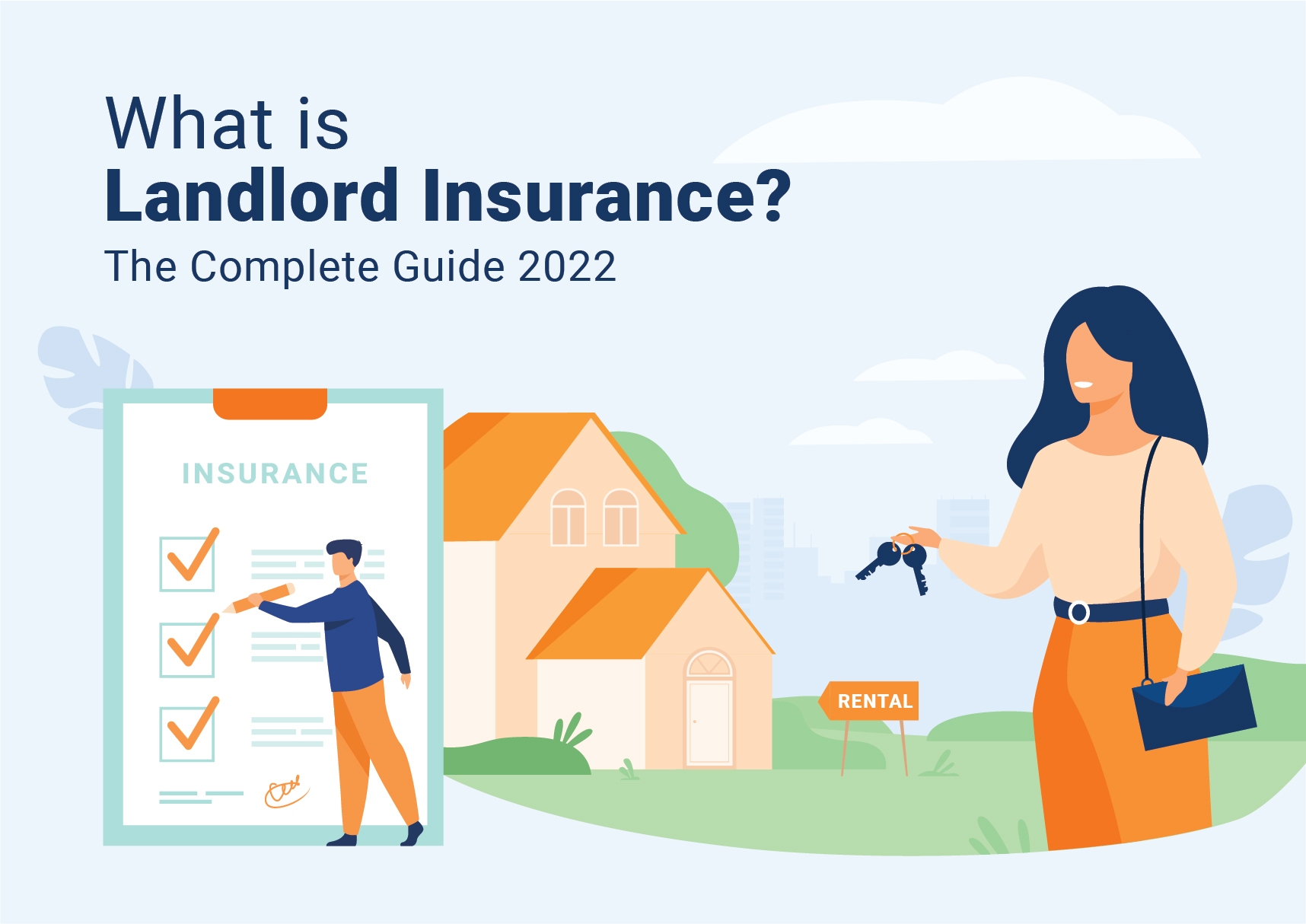What is Landlord Insurance? The Complete Guide

If you’re asking yourself the question, “what is landlord insurance?”, in this article we’ll be answering that question. As well as taking a look at a few other things. Such as why landlord insurance should be a consideration for any investor renting out their property. And the types of landlord insurance cover and the things you should consider to find the best landlord insurance.
An important element of being a landlord is making sure you have the right insurance in place. If you’re renting out a home you own to tenants, it’s important that your investment property is sufficiently protected. Especially in case of damage to the property or its contents. Or should tenants fail to pay or you experience loss of rental income due to other factors.
What is Landlord Insurance?
Landlord home insurance is designed to protect landlords from the risks that can come with owning a rental property. Much like regular home insurance, it can include buildings and landlord contents insurance, as well as be extended to specific challenges landlords may face, such as: loss of rent, tenant default and property owners’ liability to protect you from third-party claims.
The purpose of landlord’s insurance is to protect you from financial losses connected to owning a rental property. This can be things like: theft, water or fire damage, unpaid rent and damage made by tenants.
It can also cover legal costs if you’re taken to court by a tenant or need to evict them. Landlord insurance can also cover the cost of alternative accommodation for tenants if the rental property becomes uninhabitable. In some cases, it can even cover the cost of malicious damage caused by a tenant.
Landlords Insurance Vs Standard Home Insurance
What is landlord insurance compared to standard home insurance?
The main difference between landlord’s insurance and normal home insurance is that if you earn money by taking rent, your insurance provider views you as a business. Even though you might not operate or consider yourself as one.
This means that regular home insurance is not sufficient for landlords.
There will be gaps in coverage that will not meet your needs. Especially for things like loss of rent, liability and other legal areas. In addition, renting out your home may invalidate the home insurance policy. So it’s important to protect your material assets by ensuring you have the right landlord’s insurance in place.
Having the right landlord’s insurance in place can provide peace of mind. As it means you are covered for any potential problems that may arise during the tenancy agreement. This could save you thousands of pounds in legal fees or repairs should anything go wrong.
If you’re interested in learning more about the misconceptions about property insurance, check out this article.
What are the Different Types of Landlord Insurance Available?
 There are five main types of property owners insurance available:
There are five main types of property owners insurance available:
Landlord Buildings Insurance
Landlord building insurance usually covers the cost of repairing or rebuilding your property should it be damaged or destroyed.
For example, if a fire destroyed the property or a water pipe burst causing extensive damage to the inside of your property, its structure or the building, this type of insurance would usually ensure you are covered.
In addition to covering the cost of repair or rebuilding, landlord building insurance covers a few more things. It may also cover certain fixtures and fittings inside the property. This could include things like bathroom suites, kitchen units and carpets.
Accidental Damage Insurance
Accidental damage insurance covers your property against damage caused by tenants.
For example, if your tenants host a party and damage light fixtures, furniture or appliances, accidental damage insurance will usually cover it. Accidental Damage Insurance is an important part of any rental property owner’s policy. It provides peace of mind knowing that you are covered if something unexpected and costly happens.
In addition, it can help you avoid having to pay out-of-pocket for repairs or replacement items, which can be expensive.
Landlord Contents Insurance
Landlord contents insurance will typically cover your furniture if it’s stolen or damaged. Whether a fire, flood or malicious damage, the cost of a few pieces of furniture, appliances or household goods can quickly add up. So it’s worth investigating if this type of insurance might be right for you.
If you are renting out a property without furniture, you might not need to get landlord contents insurance. However, whether fully-furnished or partially furnished property, landlords contents insurance is an important consideration.
Tenants are responsible for their own contents insurance, and landlord contents insurance doesn’t cover damage to your tenants’ belongings.
Tenant Default Insurance
Tenant default insurance, or landlord rent guarantee insurance, can cover your rent should tenants fail to pay or keep up with rental payments. Rental protection will typically cover up to £50,000 rental indemnity over a 12-month rental period.
For example, if a tenant falls behind in rent and misses 3 months of payments and you issue notice, your insurance will usually cover the period of unpaid rent. It is important to note that the insurance does not cover any damage caused by the tenant, only missed rental payments.
Landlord Public Liability insurance
As a landlord you are responsible for ensuring that the property you are renting out is maintained in a safe condition. Landlords can be held for damages or compensation by a third party should an accident occur.
Property owner liability insurance will cover you if a tenant claims you are responsible for an injury or damage to their possessions. For example, if a tenant trips on a loose tile and injures themselves, property owner liability insurance can cover you if there is an expensive payout.
Property owner’s liability is usually set at limits from £1 million to £5 million depending on the potential size of the claim. You should consider the type of property and the number of individual occupants in the event of a serious accident.
Why Do I Need Landlord Insurance?
As well as learning what landlord insurance is, let’s take a look at why you should give property owners insurance some serious consideration.
Renting out and maintaining a property can be time demanding, especially with new regulations and changing legal requirements. Landlord insurance can give you peace of mind that things will be taken care of if anything goes wrong or the unexpected happens.
Standard home insurance will not cover any property you’re renting out, so it’s important to make sure you are covered with the right insurance in place.
While having landlord home insurance isn’t a legal requirement, often mortgage lenders will request you have buy-to-let insurance on a property in order to qualify for a loan. This is why it’s important to check with your lender what their requirements are and make sure you are compliant.
Additionally, a good landlord insurance policy will protect you from events such as tenant default or malicious damage. It can also offer protection against legal matters, ensuring any time spent in court is covered if the worst should happen.
What is the Average Cost of Landlord Insurance?
A few factors will impact the cost of landlord insurance and the premium you pay each month:
- The property type, location and tenant market. An insurer will take these into consideration when giving a quote. For example, student properties tend to be subject to more wear and tear and premiums for student properties may be higher than for residential property.
For things like tenant liability insurance, your premium may also be impacted by whether or not your tenant demographic is employed.
- The scope of coverage you desire. Whether you choose to add tenant liability insurance, landlord content insurance and property owner liability insurance will impact the premium you pay each month.
- The level of your coverage. For landlords’ building insurance and contents insurances, cover levels are usually based on the rebuild or replacement value – the higher the value of the building or appliances, the higher your premium is likely to be. It’s important to accurately guess the value to ensure you are fully covered if you need to make a claim.
As with any insurance, your premium is based on the likelihood that you will make a claim and the cost of such a claim. Make sure all information about the property, its content and tenants is up to date to ensure the policy will deliver adequate coverage.
Insurers may also take into account things like the location of the property, the security measures, and the employment status of the tenants when calculating your premium.
Other factors impacting the premium you’ll pay include:
- The rebuild costs,
- The contents,
- Number of tenants,
- Property type and location,
- The level of excess.
Multi-Property Landlord Insurance
Usually, property owner’s insurance is taken out on a property-by-property basis. For landlords that have multiple properties, portfolio policies are often available for those that own four or more rented homes and want to insure them at the same time.
Often, it’s possible to get a discount for insuring multiple properties at once in a portfolio. With most insurers it’s easy to add new properties to existing ones so they all renew at the same time.
This can help to save time and effort on the part of the landlord. It’s also possible to have different levels of coverage for different properties, depending on the type of property and its location. Portfolio policies may also offer additional benefits that are not available through individual policies.
Insurance for Houses in Multiple Occupation
HMO landlord insurance is a type of insurance designed for when several tenants are sharing a residential property and common areas like kitchens, bathrooms and living rooms. If your property is classed as an HMO you’ll need to register it as such under your landlord’s insurance policy.
HMO residences are viewed as “higher risk” due to the number of people living in the property. The cost of landlord HMO insurance will depend on the size and location of the property, number of tenants, and a few of other factors.
It is important to look at the different policies available and ensure that you are getting the best cover for your needs. Also it’s important to understand what type of cover your policy will provide and what it will not cover.
Furthermore, you should remember that HMO landlord insurance can be expensive so it is worth shopping around for the best deal. Comparing different policies from different providers can help you find the best policy for your needs at an affordable price.
What Should I Consider When Looking into Landlord Insurance?
 Before you take out any policy to cover the property you rent out, it’s important to get to grips with a few essential factors:
Before you take out any policy to cover the property you rent out, it’s important to get to grips with a few essential factors:
Excess
When you make a claim, you’ll usually need to pay something towards the cost – known as excess. You’ll need to choose the level of excess you are comfortable with paying if you need to make a claim on an insurance policy. The level of excess you choose will impact how much the policy will cost.
For example, some policies may change £500 excess on plumbing-related claims, if you choose a lower excess, usually the premium will increase. In addition, coverage like rental guarantee insurance will usually come with an excess of one month’s rent.
Exclusions
Any insurance policy will come with a list of things that aren’t covered by the policy, known as exclusions. Be sure to read what your policy will not cover before choosing your landlord insurance.
Common exclusions for landlord insurance include any damage or loss caused by the tenant. As well as any damages or losses from wear and tear. Anything that was already damaged before the policy was taken out will not be covered either.
Sum Insured
The sum insured is the maximum amount of money the insurer will pay out in a single claim. Ideally, the sum insured should be equal to the cost of rebuilding the property.
It’s important to remember that if the sum insured is too low and a claim is made that exceeds this amount, then the insurer will only pay out up to the sum insured. This may mean that you have to cover some of the costs yourself. Therefore, it is essential to make sure that your sum insured is accurate.
FAQs
Is landlord insurance a legal requirement?
Landlord insurance is not a legal requirement. However, it may be a condition requested by most lenders if you are getting a buy-to-let mortgage.
Being a landlord comes with additional risks that you may not face in your own home. If a tenant gets injured you may be found at fault and face a legal claim. Fire or water damage could mean you can’t rent the property out for several months. In order to reduce risk, it’s a good idea to take out landlord insurance when renting to tenants.
Do I need landlord insurance if renting out to family members?
Whoever you are renting to, it’s a good idea to find a landlord insurance policy. One that will cover you against loss of income or legal claims. While you may not think these are suitable when renting a property out to family members, having coverage will give you peace of mind if the house or anything inside it is damaged.
What landlord insurance do I need?
The type of landlord insurance you need will first depend on the type of property. Whether residential, HMO, or something else. Another factor is how much coverage you feel you need. Do you want a simple policy that only covers the cost of repairing or rebuilding the property? Or something more significant that will also cover the contents inside. As well as any accidental damage by tenants and coverage should tenants default on rent?
____________________________________________________________________________________________
Conclusion
This article should have answered your questions on what is landlord insurance? While not a legal requirement, for the peace of mind and protection it offers, we think landlord insurance is essential for any buy-to-let-property investor. With the right insurance in place you will be covered should anything happen to your investment. As well as ensure the contents inside can be easily replaced and be covered for a payout if a tenant or third party claims you are responsible for an injury or damage to their possessions and you’re found at fault.

